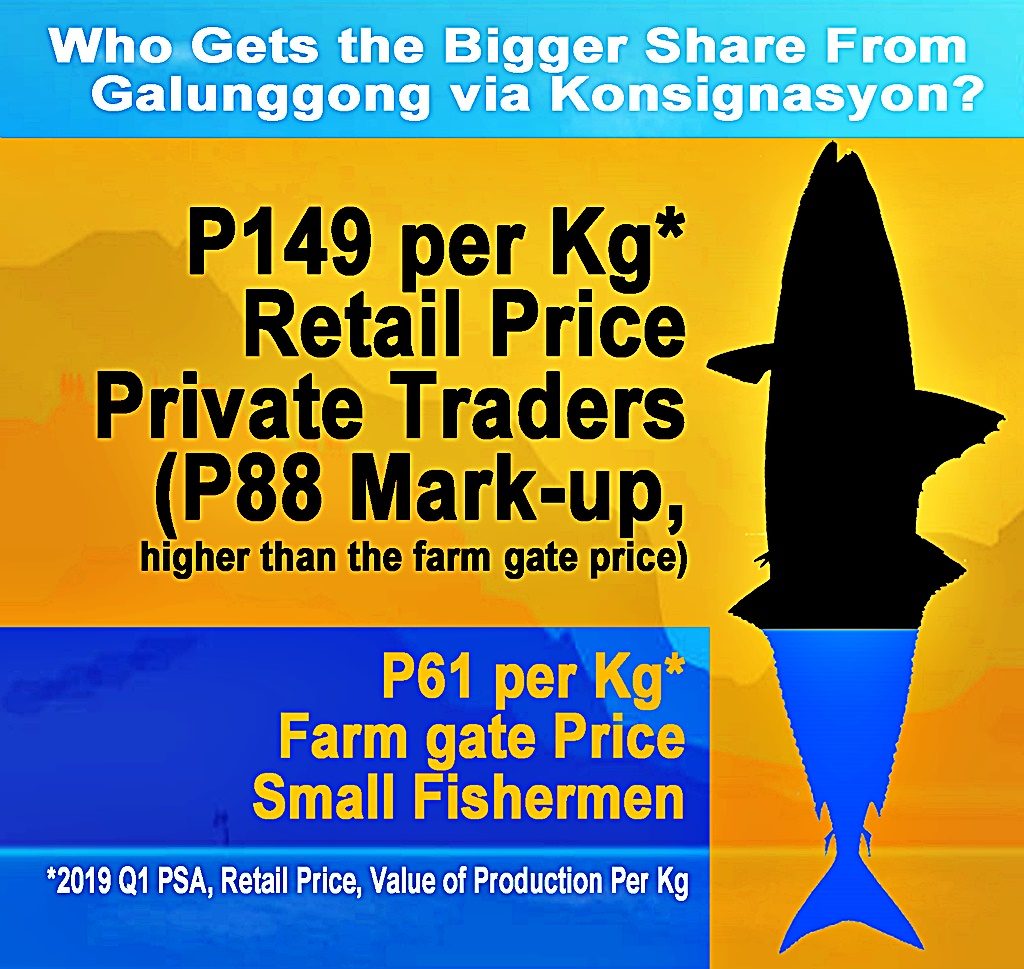Fishers call to stabilize galunggong prices by abolishing “konsignasyon” or middlemen control

Manila, Philippines – Amid skyrocketing retail prices of “galunggong” or round scad from around P150 to P170 per kilo to P250 to P300 per kilo, and instead of the government band-aid solution to import 45,000 metric tons, the Pambansang Lakas ng Kilusang Mamamalakaya ng Pilipinas (PAMALAKAYA) proposed to stabilize them by decisively abolishing the “konsignasyon” system or control of middlemen to the fish trade in the country.
PAMALAKAYA National Chairperson and former Anakpawis Party-list Representative Fernando “Ka Pando” Hicap said that galunggong farm gate prices are very low, but the stocks passes through around 4 to 5 middlemen or private consignation, who secure their profits by marking up, that eventually pushes up the retail prices at the markets.
“Bago pa man dumating sa palengke, apat hanggang limang kamay muna ang dadaanan ng mga isda matapos bilhin sa mga mangingisda sa napakababang halagang P60 hanggang P70 kada kilo. Kaya, ang sistemang ito ay parehong nagdedehado sa producer at consumer. Ito ang dapat buwagin para ma-istabilisa ang presyo ng galunggong at iba pang isda sa merkado,” said Hicap.
Instead, the fisherfolk leader proposed that fishports or “landingan” should be turned over to fishermen cooperatives to rid away of control and dominance of private traders. In this way, retail prices of fish products at the markets would be pulled down as unproductive marking up would be avoided.
He recalled that when the Duterte government approved the importation of the 17,000 metric tons of galunggong last year, the farm gate prices dove down to P60 affecting small fishermen, while the retail prices remained high at P150 to P170 per kilo. Thus, the latest approval to import from China and Vietnam would also impact the small fishermen, but does not guarantee the pulling down the retail prices.
“Noong nakaraang taon, ang mga private trader ay nagpatong ng 150% hanggang malapit 200% sa farm gate price, at hindi hinila pababa ng imported ang presyo. Ang kaisipan ng mga neoliberal economists na ang supply na may importasyon ay hihila pababa sa presyo ay laos na, dahil ang merkado ay kontrolado na ng mga monopoly traders na nagdidikta sa presyong magsisiguro ng kanilang gahiganteng tubo. Ang panalo sa hakbang ng Duterte government ay mga mayayamang trader sa fishery sector, hindi ang mahihirap na mangingisda at konsyumer,” he explained.
He stressed that the approved volume to import equates to more than a quarter of galunggong production last year of 168,000 metric tons, thus, seriously pulling down self-sufficiency. Average monthly production from 2016 to 2018 was at 14,000 to 17,000 metric tons.
“Malinaw na hindi hihilain pababa ng importasyon ang presyo dahil mismong mga importer ay hindi naman mag-iimport ng sobra-sobra, ita-timing nila ito sa panahon na kikita sila umiiral na presyo, habang ang maliliit na mangingisda sa bansa ang regular na kawawa sa pambabarat sa farm gate price,” he added.
“Kung sakali, pangalawa na itong pagwasak ni Duterte sa mga sektor sa agrikultura na kung saan umaasa ang mahihirap na mamamayan. Inuna na niyang wasakin ang produksyon ng palay sa bansa, ngayon naman ay galunggong. Malinaw na ang programang liberalisasyon sa pangisdaan at agrikultura ay kontra sa interes ng mamamayan para sa national food security at self-sufficiency,” he ended. ###
